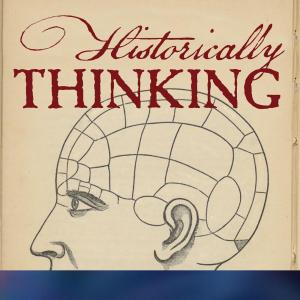Historically Thinking

Episode 343: Talking Anglo-Saxon
In his Dictionary of the English Language, first published in 1755, Samuel Johnson did not define the words Saxon, Angle, or Anglo-Saxon. But Noah Webster in his 1828 American Dictionary defines Anglo-Saxon as "adjective. Pertaining to the Saxons, who settled in England, or English Saxons." Something had happened in between the two, and not just the American Revolution, and Johnson's and Webster's different views of that event–but that probably did contribute to the difference. And when Webster published his definition, the term was already taking on new connotations. Indeed, the term Anglo-Saxon has a rich and complicated history, right to the present moment. And so does perception of the peoples to which it refers…or does it actually refer to them? With me to discuss the history of the definition and the ideology of the term is Rory Naismith, Professor of Early Medieval English History at the University of Cambridge, Fellow of Corpus Christi College. Author of numerous books, including Citadel of the Saxons: The Rise of Early London, he was last on the podcast talking about medieval money in Episode 328. For Further Investigation Content, S., and Williams, H., ‘Creating the Pagan English, from the Tudors to the Present Day’, in Signals of Belief in Early England: Anglo-Saxon Paganism Revisited, ed. M. Carver, A. Sanmark and S. Semple (Oxford, 2010), pp. 181–200 Foot, S., ‘The Making of Angelcynn: English Identity before the Norman Conquest’, Transactions of the Royal Historical Society, 6th ser., 6 (1996), 25–50 [on use of Anglo-Saxon and English terminology in the pre-Norman period itself] Frantzen, A. J., and Niles, J. D. (eds.), Anglo-Saxonism and the Construction of Social Identity (Gainesville, FL, 1997) [a collection of essays - the introduction is probably the most helpful single thing] Horsman, R., Race and Manifest Destiny: the Origins of American Racial Anglo-Saxonism (Cambridge, MA, 1981) [this is really good on the early modern and American side of the story] Kidd, C., British Identities before Nationalism: Ethnicity and Nationhood in the Atlantic World 1600–1800 (Cambridge, 1999), esp. ch. 4–5 and 9 [again, excellent on early modern Anglo-Saxonism] Mandler, P., The English National Character: the History of an Idea from Edmund Burke to Tony Blair (New Haven, 2006), esp. ch. 3 Niles, J., The Idea of Anglo-Saxon England 1066–1901 (Oxford, 2015) Rory Naismith observes, "There is also a welter of very polemical stuff on the web; for a selection, see below" Rubinstein, S., ‘Anglo-Saxon Extremists: the Strange Logic of the Activists who Insist the Term “Anglo-Saxon” is Racist’, The Critic, June 2023 Rambaran-Olm, M., ‘History Bites: Resources on the Problematic Term “Anglo-Saxon”’, a three-part series on Medium: Part 1, Part 2, Part 3, 7 September 2020 Rambaran-Olm, M., ‘Misnaming the Medieval: Rejecting “Anglo-Saxon” Studies’, History Workshop, 4 November 2019 Rambaran-Olm, M., and Wade, E., ‘The Many Myths of the Term “Anglo-Saxon”’, Smithsonian Magazine, 14 July 2021 Sewer, A., ‘“Anglo-Saxon” is What You Say when “Whites Only” is Too Inclusive’, The Atlantic, 20 April 2021 Williams, H., ‘The Fight for “Anglo-Saxon”’, Aeon, 29 May 2020 Wood, M., ‘“As a Racism Row Rumbles on, is it Time to Retire the Term ‘Anglo-Saxon’?” Michael Wood Explores the Controversy’, History Extra, 4 November 2019






 Visit Podcast Website
Visit Podcast Website RSS Podcast Feed
RSS Podcast Feed Subscribe
Subscribe
 Add to MyCast
Add to MyCast